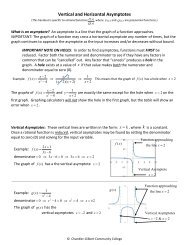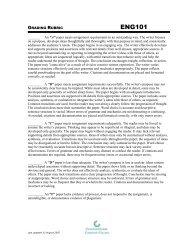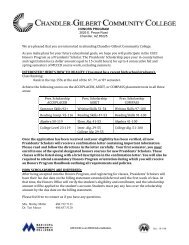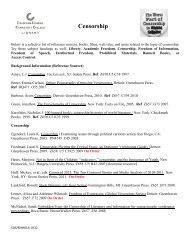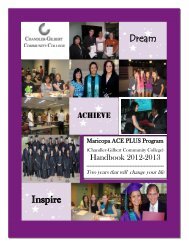Tutor Training Manual.indd - Chandler-Gilbert Community College
Tutor Training Manual.indd - Chandler-Gilbert Community College
Tutor Training Manual.indd - Chandler-Gilbert Community College
Create successful ePaper yourself
Turn your PDF publications into a flip-book with our unique Google optimized e-Paper software.
4<br />
• Be patient.<br />
Try not to act annoyed with student’s progress or lack thereof. Focus on the learning<br />
activity. Your annoyance may reinforce negative attitudes toward the course and their<br />
general ability.<br />
• Be a “prober.”<br />
Rather than feed the student answers, probe or prompt the student to remain in an<br />
active role in the tutoring process. Engage him/her in a joint exploration of problems<br />
and concerns. Verbalization builds self-confidence and enhances learning. The tutee<br />
should be talking about 75% of your session. (You should be talking only about 25% of<br />
the time.) Don’t turn your tutoring time into just another class lecture.<br />
• Be flexible.<br />
Remember that the style and content of the material to be learned should be adjusted to<br />
the individual being tutored. Be resourceful and use initiative in devising or trying new<br />
methods and approaches to learning the subject at hand.<br />
• Encourage your tutees to focus on “learning how to learn.”<br />
Try to get them to concentrate on developing mental processes and learning strategies<br />
rather than on getting the “correct answers” and using rote memorization. Poor use<br />
of time and lack of good study habits are major shortcomings. Help tutees to master<br />
techniques that will help them to become efficient learners.<br />
• Be a good listener.<br />
Be aware of both verbal and non-verbal clues. Listen carefully to all of the messages<br />
about their feelings, the progress being made, concerns with the subject matter and<br />
course requirements. If you end up doing most of the talking at tutoring sessions,<br />
something is wrong.<br />
• Even if you disagree with the way the course is being taught, you are to<br />
support the methods of the instructor.<br />
REMEMBER: you are a tutor, not the professor. You are not responsible for teaching<br />
or grading the course and must recognize and accept your limitations. Under no<br />
circumstances should a tutor “degrade” a faculty member. It is imperative that you<br />
maintain a “professional” attitude and behavior. If there is a major conflict, please<br />
consult with the LC Director for support and guidance.<br />
• Have confidence in yourself, but don’t be afraid to ask for help and<br />
guidance.<br />
Don’t hesitate to say that you do not know an answer. Be willing to research the matter<br />
and get back to your tutees at the next session. Your tutees will enjoy finding out that<br />
you are human too!



